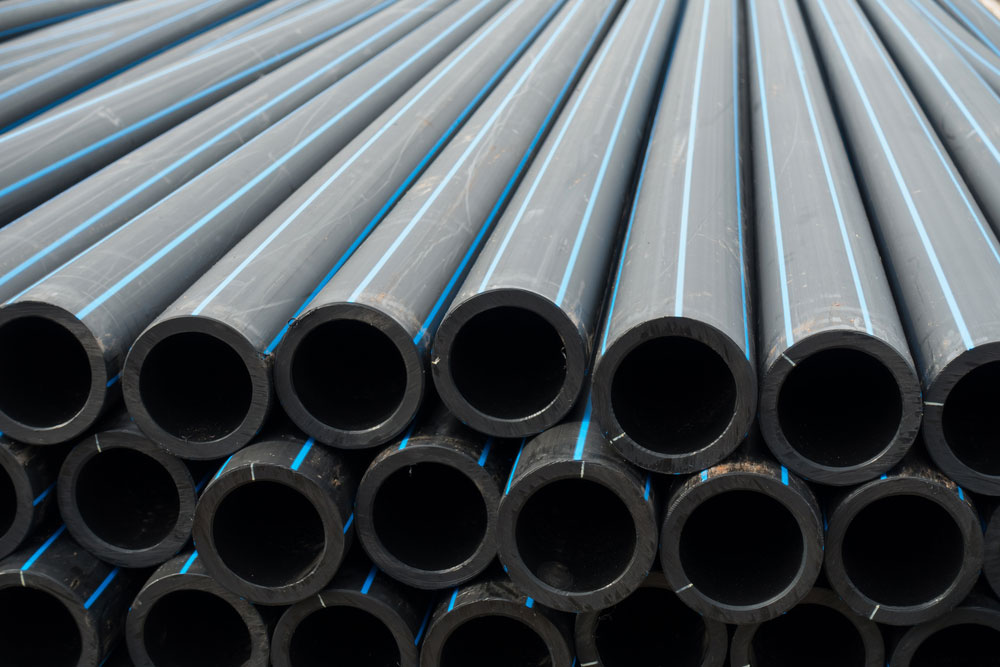Why Partnering with Pipe Supplier American Plastics Midland Ensures Quality Assurance
Comprehending the Key Conveniences of HDPE Pipeline for Water and Wastewater Management
The use of HDPE pipe in water and wastewater administration presents various benefits that warrant factor to consider. Its remarkable toughness and lengthy lifespan make it a preferred choice for many jobs. Furthermore, the material's resistance to deterioration and chemical damages boosts its dependability in various settings. However, the advantages prolong past just longevity and resistance. Exploring its cost-effectiveness and environmental influence discloses a lot more compelling factors for its widespread adoption in modern facilities
Outstanding Durability and Long Life

HDPE pipe sticks out for its outstanding sturdiness and longevity, making it a favored choice in water monitoring systems. Built from high-density polyethylene, these pipes can withstand considerable pressure and stress, making sure dependable performance in time. Their durable nature allows them to withstand severe environmental conditions, including temperature fluctuations and soil activities, which can cause other products to stop working.
The life-span of HDPE pipes frequently goes beyond half a century, offering an economical option for towns and industries alike. Additionally, the material's lightweight residential properties simplify setup, lowering labor prices and timeframes. This sturdiness reduces the demand for constant repair work or replacements, additionally improving its financial appeal.
In water monitoring applications, the dependability of HDPE pipes means less disturbances and enhanced solution connection, making them indispensable to sustainable facilities advancement. The combination of sturdiness and durability solidifies HDPE's role as a foundation in efficient water monitoring remedies.

Resistance to Deterioration and Chemical Damage
While numerous products catch corrosion and chemical damages gradually, HDPE pipes exhibit amazing resistance, making them perfect for various water management applications. This resilience comes from the molecular framework of high-density polyethylene, which is inherently non-reactive and does not rust like metals or deteriorate from exposure to extreme chemicals. As an outcome, HDPE is extremely effective in environments with hostile substances, such as wastewater systems that may have acids, bases, and natural solvents.
Additionally, HDPE pipelines can withstand environmental variables such as soil acidity and saline problems, additionally improving their viability for varied applications (custom hdpe pipe manufacturing Midland TX). Their capacity to maintain structural honesty in time lowers the risk of leaks and failings, which is important in making certain the safety and security and dependability of water circulation and wastewater monitoring systems. Subsequently, the resistance to rust and chemical damage noticeably adds to the general efficiency and durability of HDPE piping options
Cost-Effectiveness and Economic Advantages
When thinking about the monetary ramifications of water management systems, the cost-effectiveness of HDPE pipes comes to be evident. These pipes supply lower setup and upkeep costs compared to standard materials like metal or concrete. Their lightweight nature streamlines transport and setup, causing decreased labor expenses. In addition, HDPE pipes display a lengthy life-span, frequently exceeding half a century, which equates to fewer substitutes and lasting financial savings.
Additionally, the resistance of HDPE to corrosion and chemical damages reduces the requirement for expensive repair work and substitutes. The pipes likewise sustain efficient water flow, minimizing energy prices related to pumping systems. By minimizing leakages and water loss, HDPE pipes add to substantial economic benefits for municipalities and sectors alike. Generally, the preliminary financial investment in HDPE piping can yield significant financial returns over the life expectancy of the water monitoring system, making it a prudent selection for sustainable framework development.
Ecological Sustainability and Reduced Effect

Versatility and Adaptability in Setup
Because of their unique homes, HDPE pipelines supply amazing convenience and versatility in installment, making them suitable for a large range of applications. Their light-weight nature enables simpler handling and transport, decreasing labor prices and installment time. HDPE pipes can be bent and shaped to fit various terrains and job requirements, which is particularly valuable in testing atmospheres.
Additionally, their resistance to corrosion and chemical damages permits installment in diverse settings without the requirement for specialized protective finishings. The capability to fuse joints produces a continuous, leak-free system, enhancing the overall integrity and integrity of the setup. HDPE's adaptability also fits ground movement, lowering the threat of damages in areas susceptible to moving dirt. Generally, these characteristics make HDPE pipes not just versatile but additionally a favored selection for water and wastewater management systems.
Regularly Asked Inquiries
Just How Does HDPE Pipe Contrast to PVC in Water Monitoring Applications?
HDPE pipe supplies superior adaptability, resistance to rust, and longevity compared to PVC. Its lighter weight promotes much easier installment, while its long life expectancy minimizes substitute costs, making HDPE a recommended selection in water management applications.
What Is the Life Expectancy of HDPE Pipeline Under Typical Conditions?
Under normal problems, HDPE pipelines can check my blog have a lifespan varying from 50 to 100 years. Their durability and resistance to deterioration contribute to their lasting performance in numerous applications, making them a trustworthy option for infrastructure.
Are HDPE Pipes Recyclable After Their Service Life?
Yes, HDPE pipelines are recyclable after their solution life. hdpe pipe in stock Midland TX. They can be processed and repurposed right into brand-new items, significantly reducing ecological influence and promoting sustainability within the sector, making them a green choice for piping solutions
What Is the Installation Process for HDPE Piping?
The installation procedure for HDPE pipes involves website preparation, trenching, pipe blend or mechanical joining, backfilling, and pressure testing. Correct strategies assure a long lasting and efficient gas line protection system for moving water and wastewater effectively.
Can HDPE Water Lines Be Utilized for Both Potable and Non-Potable Water Systems?
Yes, HDPE pipes can be used for both drinkable and non-potable water systems. Their flexibility, sturdiness, and resistance to corrosion make them suitable for different applications, making sure secure and effective transportation of water in different contexts.